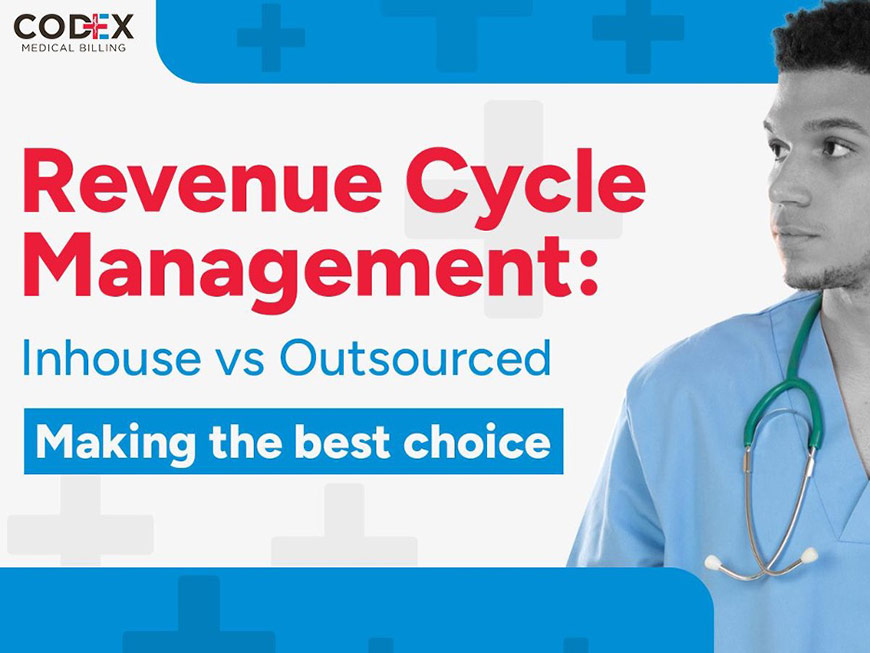Important New Business Registration Requirement Start in 2024 Understanding the New Business Registration Requirement There…

For physicians and medical practice business owners in the healthcare industry, choosing between in-house vs. outsourced Revenue Cycle Management or RCM services is a question that often pops up.
With flexible rules and technology that progress at breakneck speed, it’s no wonder that many of us find ourselves with a dilemma: Do we lean on our trusted in-house team’s capabilities or do we explore the potential benefits of outsourcing RCM? Favoring in-house vs. outsourced RCM may seem like a tough choice, but by going deeper into this discussion, we hope to equip you with actionable insights to help you confidently make the best-informed decision for your organization. You got this!
Table Of Contents:
- The Shift Towards Outsourcing Revenue Cycle Management (RCM)
- The Benefits & Risks of Outsourcing RCM
- Making The Hard Decisions: Overall Analysis and Other Factors
The Shift Towards Outsourcing Revenue Cycle Management (RCM)
The pandemic has significantly affected healthcare facilities’ approach to managing revenue cycles, with many turning to outsourcing. This change is largely due to the rise of effective remote work technologies, allowing outsourced teams to deliver high-quality RCM services from anywhere in the country.
Outsourcing also offers cost savings. The expenses of salaries, benefits, and training for an in-house billing and coding team can be substantially reduced.
However, there are some risks involved in entrusting your medical billing process to an outsourced team. We will be tackling some of the benefits and risks associated with in-house and outsourcing.
The Benefits & Risks of In-House RCM Teams
As we discuss In-House vs. Outsourced RCM, it’s worthwhile to consider what opting for an in-house revenue cycle management processes team means for your organization. There’s a lot to unpack here, and it boils down to more than dollars and cents.
Having an in-house RCM team can feel like having a safety net. These are professionals who don’t just understand the work but also understand your organization, its rhythm, its unique needs, and its ways of doing things. But like all choices, it comes with its flip side.
Let’s narrow down what an in-house RCM team offers – the good, the bad, and everything in between:
Benefits:
- Control and Customization: In-house RCM allows for greater control over the billing and revenue cycle processes. Practices can tailor their RCM strategies to fit their specific needs, preferences, and patient demographics. This level of control ensures that the billing process aligns closely with the practice’s policies, culture, and operational goals.
- Direct Communication and Coordination: Having the RCM team within the organization facilitates direct and immediate communication between healthcare providers and the billing staff. This can lead to quicker resolution of billing issues, more effective coordination in patient care decisions impacting billing, and a more integrated approach to managing patient accounts.
- Data Security and Compliance: Managing RCM internally can offer more direct oversight of data security and compliance with regulations such as HIPAA. The practice has complete authority over how patient data is handled and stored, reducing the risk of data breaches that can occur when transmitting information to third-party vendors. This direct control can be crucial in ensuring compliance with healthcare regulations and protecting patient privacy.
While in-house RCM requires investment in staff, training, and technology, these benefits can be significant for practices that prioritize direct control, seamless integration of clinical and administrative functions, and stringent data security.
Risks:
- Higher Costs and Resource Allocation: In-house RCM often involves higher operational costs. This includes expenses related to hiring and training staff, investing in technology and software, and maintaining the necessary infrastructure. Additionally, resources that could be allocated to patient care or practice expansion might be diverted to managing the RCM process.
- Complexity and Compliance Challenges: The healthcare billing and reimbursement landscape is complex and constantly evolving. Staying updated with the latest coding standards, billing regulations, and payer requirements demands significant expertise and continuous training. In-house teams may struggle to keep up with these changes, increasing the risk of coding errors, non-compliance, and claim denials.
- Risk of Inefficiency and Errors: In-house RCM teams, particularly in smaller practices, may not have the same level of expertise or access to advanced tools as specialized RCM companies. This can lead to inefficiencies in the billing process, increased errors, and longer turnaround times for claim processing and reimbursement. Additionally, internal teams might lack redundancy and scalability, which can be a problem in cases of staff turnover or increased workload.
Balancing these risks with the benefits is crucial for a medical practice when deciding whether to manage RCM internally or to outsource it. Effective management, ongoing training, and investment in technology are key to mitigating these risks if a practice chooses to maintain an in-house RCM team.

The Benefits & Risks of Outsourcing RCM Teams
Imagine a third-party billing team, diligently working behind the scenes, transforming the whole process into an efficient, lean machine. Revenue losses are minimized, profits are maximized, and healthcare providers can focus their energies back on where it matters most – outstanding patient care.
Like any good change, it’s natural for it to invite a dose of skepticism along with anticipation. The potential advantages it can offer and the cautious steps it warrants:
Benefits:
- Cost Efficiency: Outsourcing RCM can be more cost-effective than maintaining an in-house team. It often reduces overhead costs associated with employee salaries, benefits, training, and infrastructure. By partnering with a specialized RCM service provider, a practice can leverage their economies of scale and expertise to manage billing and collections more efficiently and at a lower cost.
- Expertise and Compliance: RCM companies specialize in medical billing and coding, staying current with the constantly changing healthcare regulations, coding standards, and payer policies. This expertise ensures that billing is accurate, compliant with regulations like HIPAA, and optimized for maximum reimbursement. They have the tools and knowledge to navigate complex billing issues, reducing the likelihood of errors and denials.
- Focus on Patient Care: By outsourcing RCM, healthcare providers can focus more on patient care rather than administrative tasks. This can lead to better patient satisfaction and outcomes, as practitioners are able to dedicate more time and resources to clinical services rather than administrative burdens. This shift in focus can also improve overall operational efficiency and staff morale, as clinical staff are not bogged down with billing and administrative tasks.
These benefits collectively contribute to a more efficient, financially stable, and patient-focused medical practice.
Risks:
- Loss of Control: When RCM processes are outsourced, the medical practice may experience a loss of control over these functions. This can lead to concerns about the quality of service, adherence to the practice’s specific billing protocols, and the ability to quickly address issues or make changes. It’s crucial to ensure that the outsourced service aligns with the practice’s standards and expectations.
- Data Security and Privacy Concerns: Outsourcing involves sharing sensitive patient data with a third party. This raises concerns about data security and privacy, especially given the stringent regulations in healthcare like HIPAA (Health Insurance Portability and Accountability Act). There is a risk of data breaches or non-compliance issues if the RCM provider does not have robust security measures and compliance protocols in place. Reputable RCM or billing service companies like Codex Medical, are well-trained to protect sensitive patient data, and understand HIPAA privacy regulations.
- Dependency and Vendor Issues: Reliance on an external RCM provider can create dependency, making the practice vulnerable to issues like service disruptions, changes in vendor policies, or even vendor dissolution. If the outsourcing company faces operational challenges, it can directly impact the practice’s revenue cycle. Additionally, if the relationship with the vendor deteriorates or if the vendor fails to meet performance expectations, transitioning to a new provider or reverting to in-house management can be challenging and costly.
It’s important for medical practices to carefully weigh these risks against the benefits and conduct thorough due diligence when choosing an RCM outsourcing partner. Regular monitoring and clear communication channels are essential to mitigate these risks.
While caution is wise, it’s important to remember that potential risks associated with outsourcing are just that – ‘potential’, not a certainty. Countless outsourcing teams across sectors are doing fantastic jobs with committed professionalism and honesty.
Making The Hard Decisions: Overall Analysis and Other Factors
The decision to handle Revenue Cycle Management in-house vs. outsourced RCM involves a crucial review of costs and savings.
Running an in-house RCM team includes expenses like salaries, benefits, and operational costs. Despite these expenses, the benefit of control over your processes and the advantage of a particular understanding of your organization’s practices can add value beyond numbers.
On the other hand, outsourcing typically comes with cost savings by eliminating direct employee-related expenses and overheads. While outsourcing seems cost-effective, understanding the long-term return on investment is vital. Consider factors like the team’s efficiency, their technological prowess, and their capability to manage regulatory changes effectively.
Still, the final decision extends beyond pure cost analysis. It’s about aligning with your healthcare organization’s wider strategy and long-term vision. Whether going in-house or outsourcing your RCM, making a strategic investment today paves the way for a financially healthy tomorrow.
FAQs in Relation to In-House Vs. Outsourced RCM
What is Revenue Cycle Management (RCM)?
RCM refers to the process of handling claims, processing payments, and generating revenue in the healthcare industry. It includes patient registration, charge capture, coding, billing, and collecting accounts receivable.
What are the benefits and risks of In-house RCM?
In-house RCM allows direct control over processes and a deep familiarity with company-specific practices. However, it comes with high operational costs, staff turnover risk, and potential regulatory compliance challenges.
How is outsourcing RCM beneficial?
Outsourced RCM could bring cost efficiency, offer access to specialized RCM knowledge, and allow providers to focus more on patient care. But, potential downsides include possible communication challenges, data security concerns, and a loss of direct control over some aspects.
How does the cost analysis play into the choice between in-house and outsourced RCM?
Cost analysis involves comparing expenses related to maintaining an in-house team (salaries, benefits, training) with the costs or savings from outsourcing RCM processes. This analysis contributes to the overall strategic decision, considering both direct costs and long-term return on investment.
How do I choose between in-house and outsourced RCM?
The choice involves carefully considering the cost and value of both options, while also considering the specific needs of your organization. It’s about strategic investment for long-term value, aligning with your organization’s overall strategy and vision.



